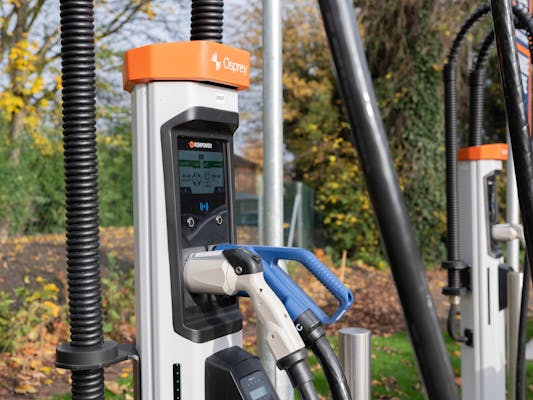Osprey receives record investment.
Osprey Charging to double UK’s number of rapid electric vehicle charging points following record £35m investment.
Osprey Charging becomes the UK’s best funded independent EV charging network as investment backs its vision of building thousands of open-access, renewably-powered rapid EV chargers.
Osprey Charging, one of the UK’s fastest growing electric vehicle (EV) rapid charging networks, will double the current number of rapid charge points in the UK by 2024. The ambitious plans are being funded by a £35 million investment commitment from Cube Infrastructure Fund II.
Osprey Charging will install over 2,000 rapid charging points across the UK. These will be at accessible public sites, including supermarkets and retail parks, enabling EV drivers to charge quickly and easily at convenient and attractive locations.
“
The EV market is marching into the mainstream. Private companies are now seizing the EV investment opportunity and nearly 75% of car buyers are considering an EV as their next vehicle. Those organisations offering public car parking can position themselves for the future by providing new value to customers and driving increased footfall by installing rapid chargers. The EV tipping point is coming and this significant investment commitment positions us at the forefront of this burgeoning market.
Ian Johnston, the CEO of Osprey Charging.
Zap Map recorded 2,189 rapid chargers across the country at the end of May 2019, so this deal will double the current number available. Osprey Charging will have rapid chargers installed at over 100 sites by Christmas. Once complete, the network could serve 5 million EVs a year, removing up to 25 tonnes of NOx annually.
Osprey Charging works in partnership with landowners to deliver fully funded and maintained rapid charging units, powered exclusively by 100% renewable energy. In the last year it has announced significant new partnerships with Marston’s Inns and Taverns, M7 Real Estate and Cardiff Council. Osprey Charging previously secured £5 million of funding from Investec, a key early institutional investor that recognised the potential of the business, which will retain its stake in Osprey Charging.
Cube Infrastructure Fund II, a €1.04 billion dynamic European infrastructure fund managed by Cube Infrastructure Managers, chose to invest in Osprey Charging due to the promising sector and the company’s long-term approach. It has previously invested in renewable energy projects, district heating networks, public transport providers, and fibre networks including London-based G Networks.
“
With transportation representing about 40% of total energy consumption in the UK and air pollution becoming a fast-growing concern, we see new mobility solutions as a critical factor in achieving energy transition targets and implementing climate change policies. Over the last decade, the funds managed by Cube Infrastructure Managers have invested in public transport operators and renewable energy generation companies actively involved in developing and operating sustainable energy and passenger transport platforms. Electro-mobility, which is lying at the intersection of these two sectors, is an integral part of our new fund’s investment focus. By investing in Osprey Charging, we intend to accelerate the deployment of its rapid EV charging infrastructure, providing over the long term an increasingly essential service to local communities across the UK, consistent with our high ESG standards.
Renaud de Matharel, CEO of Cube Infrastructure Managers
Osprey Charging’s charging points are accessible, easy-to-use, require no membership or connection fee and operate a simple contactless payment method. Each 50kW charger is compatible with all EVs on the market today and adds 80 miles of charge in just 30min (depending on the battery).
Osprey Charging anticipates making further investments in other networks, EV fleet offerings and digital services.
Investec Power and Infrastructure Finance ran a successful capital raise process generating significant interest in the Osprey Charging business. Element Energy provided technical due diligence. Cube Infrastructure Fund II was advised by DLA Piper, Via Novus by Osborne Clark, and Osprey Charging by Ince Gordon Dadds.
NO2 calculation and sources:
An average Osprey Charging charger will deliver 60kWh per day.
A standard 2012 Nissan Leaf (most common pure electric vehicle in the UK) drives 100 miles on 34kWh (Source: Green Car Reports), so would drive 176.47 miles or 284km on the 60kWh delivered per day by an Osprey Charging charger.
Which? tested the NO2 emissions of Euro 6 compliant diesel cars across all major manufacturers and the average was 0.25g/km (Euro 6 limit is 0.08g/km). Four out of five diesel cars produce more NO2 than the Euro 6 limit.
Which? also tested petrol cars and found an average NO2 emission of 0.027g/km
At the end of 2017 the split of petrol/diesel licensed cars was 60-40. So, an EV that drives 100km it is avoiding/saving the 0.027g/km of NO2 produced by petrol for 60km and the 0.25g/km produced by diesel cars for 40km.
Based on this, the 284km of zero-emission driving delivered by an Osprey Charging charging point each day is saving 284 x 0.6 = 170.4km of petrol driving and 283 x 0.4 = 113.6km of diesel driving.
At 0.027g/km and 0.25g/km petrol and diesel respectively, then, 170.4km x 0.027g/km = 4.6g and 113.6km x 0.25km = 28.4g, in total 33g of NO2 avoided per day by the driving delivered by one Osprey Charging charger.
So, on one Osprey Charging charger, 33g x 365 days = 12kg per charger per year.
The investment commitment from Cube Infrastructure Fund II is expected to expand the Osprey Charging network to 2100 chargers, so in total for the partnership pilot that’s 25 tonnes NO2 saved
Latest news
See the latest updates from Osprey





